A Way of Being Free Read online
Start Reading
About this Book
About the Author
Reviews
Also by this Author
Table of Contents
www.headofzeus.com
To my brothers,
Andrew and Godwin Okri
Introduction to the new edition
These essays began as notes to myself in a semi-poetic spirit. They were moments of poetic thought in prose.
When I find myself in a new city, I often like to go wandering. These wanderings are pleasant and reveal a place in a light I may never experience again. These pieces are like such wanderings.
I have always enjoyed reading essays. As a boy in Nigeria I discovered the essays of Montaigne, Bacon, and Hazlitt in my father’s library. They were like taking a stroll with thoughtful beings.
It is for me an axiom that words create a mysterious reality. That is why my approach to writing essays has always been a personal one. I always aim for uncluttered expression. It seems more courageous to express your thoughts clearly and simply. Nothing is more difficult than knowing what you really think. It is a curious thing to say, but it is easier to be complicated and complex than to say something truly and simply. Rigour and logic are perhaps not much appreciated, yet without logic, without rigour, writing fails. It took me many years to rid myself of needless complexities.
Some of my essays are, not surprisingly, about the art of writing. In the early years I had to think hard about the art, and I did it through these private meditations. The aphorisms of which some of the essays are constituted are a tribute to my youthful fascination with the form. To say much, concisely, is a constant ideal.
When it came to gathering my essays together for this volume, I lit upon the happy innovation of making the book into a suite, letting one of the essays run through the volume as a uniting theme.
The essays in this volume all turn on the question of freedom, in art, politics, literature, and being. The threat to freedom is always there, and does not require dictatorship, authoritarianism, or a closed society. We carry the threat with us always, and it is as pernicious when it is unseen, unsuspected, or when we assume the world we live in is exemplary.
All I wanted to do was to remind myself at all times to just sing my song. To sing it through all the difficulties and silences. I hope that those who read these essays might also enjoy mental strolling, might also want to sing their unique songs through the ambiguous times in which we breathe and dream.
Little Venice, London
August 2014
The author gratefully acknowledges permission from the following sources to reprint material in their control:
Page 3: The Human Province by Elias Canetti (Andre Deutsch); Copyright © 1973 Carl Hanser Verlag, Munchen/Wien.
Page 4: Labyrinths by Christopher Okigbo; Copyright © Christopher Okigbo 1967; Heinemann African Writers Series
Page 12: Henderson the Rain King by Saul Bellow; Copyright © Saul Bellow 1959
Page 86: Black Skin, White Masks by Franz Fanon; translated by Charles Lamb Markmann; Copyright © Grove Press Inc. 1967. Used by permission
Page 91: Introduction to The Price of the Ticket by James Baldwin, in Collected Non-Fiction; Michael Joseph 1985; Copyright © James Baldwin 1985. Reprinted with the permission of the James Baldwin Estate
While the World Sleeps
‘The poet is he who inspires far more
than he who is inspired.’
Paul Eluard
1
The world in which the poet lives does not necessarily yield up the poetic. In the hands of the poet, the world is resistant. It is only with the searching and the moulding that the unyielding world becomes transformed in a new medium of song and metaphor.
It is not surprising therefore that poets seem to be set against the world. The poet needs to be up at night, when the world sleeps; needs to be up at dawn, before the world wakes; needs to dwell in odd corners, where Tao is said to reside; needs to exist in dark places, where spiders forge their webs in silence; near the gutters, where the underside of our dreams fester. Poets need to live where others don’t care to look, and they need to do this because if they don’t they can’t sing to us of all the secret and public domains of our lives. They need to be multiple witnesses around the central masquerades of reality in order to convey fully the unimaginable dimensions of the deity’s terrible and enchanting dance.
The great tidal crowds of everyday events pour in one direction, sometimes the poet has to move in the other – often moving directly against them, at other times cutting tangentially across the morning waves of humanity. Poets seem to be set against the world because we need them to show us the falseness of our limitations, the true extent of our kingdom.
The poet turns the earth into mother, the sky becomes a shelter, the sun an inscrutable god, and the pragmatists are irritated. They want the world to come with only one name, one form. The antagonists of poets and other transformers are those who refuse to see the fluid nature of reality, who cannot perceive that each individual reality is different. Laws do not bind our perceptions. There are as many worlds as there are lives. It is not those who have no imagination who are the problem, for we all possess imagination, few of us use it well. The problem is with those who are frightened of the rather limitless validity of the imagination, frightened of people who continually extend the boundaries of the possible, people who ceaselessly redream the world and reinvent existence; frontiers people of the unknown and the uncharted.
The enemies of poets are those who have no genuine religious thinking. To be truly religious does not require an institution, it requires terror, faith, compassion, imagination, and a belief in more than three dimensions. It also requires love. Religion touches us at the place where imagination blends into the divine. Poetry touches us where religion is inseparable from the wholly human. In heaven there could be no poetry. The same is true of hell. It is only on a sphere where heaven and hell are mixed into the fabric of the mortal frame that poetry is possible.
Poets are set against the world because they cannot accept that what there seems to be is all there is. Elias Canetti wrote once that: ‘The inklings of poets are the forgotten adventures of God.’ Poets are not the unacknowledged legislators of the world. They come with no tablets of stone, and they do not speak with God. They speak to us. Creation speaks to them. They listen. They remake the world in words, from dreams. Intuitions which could only come from the secret mouths of gods whisper to them through all of life, of nature, of visible and invisible agencies. Storms speak to them. Thunder breathes on them. Human suffering drives them. Flowers move their pens. Words themselves speak to them and bring forth more words. The poet is the widener of consciousness. The poet suffers our agonies as well and combines them with all the forgotten waves of childhood. Out of the mouths of poets speak the yearnings of our lives.
The acknowledged legislators of the world take the world as given. They dislike mysteries, for mysteries cannot be coded, or legislated, and wonder cannot be made into law. And so these legislators police the accepted frontiers of things. Politicians, heads of state, kings, religious leaders, soldiers, the rich, the powerful – they all fancy themselves the masters of this earthly kingdom. They speak to us of facts, policies, statistics, programmes, abstract and severe moralities. But the dreams of the people are beyond them, and would trouble them. The hard realities of the people would alarm them. It is they who have to curb the poet’s vision of reality. It is they who invoke the infamous ‘poetic licence’ whenever they do not want to face the inescapable tragedy contained in, for example, Okigbo’s words: ‘I have lived the oracle dry on the cradle of a new generation.’ It is they who demand that poetry be partisan, that it
takes sides, usually their side; that it rides on the back of causes and issues, their causes, their issues, whoever they may be.
Our lives have become narrow enough. Our dreams strain to widen them, to bring to our waking consciousness the awareness of greater discoveries that lie just beyond the limits of our sights. We must not force our poets to limit the world any further. That is a crime against life itself. If the poet begins to speak only of narrow things, of things that we can effortlessly digest and recognise, of things that do not disturb, frighten, stir, or annoy us, or make us restless for more, make us cry for greater justice, make us want to set sail and explore inklings murdered in our youths, if the poet sings only of our restricted angles and in restricted terms and in restricted language, then what hope is there for any of us in this world?
Those of us who want this are cowards, in flesh and in spirit. We fear heroic heights. We dread the recombining of the world, dread a greater harvest of being. We sit lazily and demand that our poets draw the horizon closer. We therefore become separated from our true selves. Then even beauty can seem repugnant. Then, we no longer recognise who we are, and we forget what we used to be, what states we sometimes inhabited, what extended moments of awareness. It is those who are scared of reality, of their own truths, of their own histories, those who are secretly sickened by what they have become, who are alarmed by the strange mask-like faces that peer back at them from the mirrors of time, it is they who resist the poetic. They resist the poetic with all their hidden might because if they don’t, the power of words speaking in their own heads would burst open their inner doors, and all the monsters breeding within would come bounding out and crashing on the floors of their consciousness. What would hold their inner frames together then? They have to suppress the poetic, or accept it only on blurred terms, or promote its cruder imitations, for the simple reason that they have long ago begun suppressing eruptive life and all its irreconcilable shadings, its natural paradoxes.
The antagonists of poetry cannot win. The world seems resistant but carries within it for ever the desire to be transformed into something higher. The world may seem unyielding but, like invisible forces in the air, it merely awaits imagination and will to unloosen the magic within itself. The poet is not a creator but an alchemist. Poets are helplessly on the side of the greatest good, the highest causes, the most just future.
And because they are helplessly on the side of the future it may be valid to say that they need their antagonists. Poets need to be kept alive and awake. We should beware the hardening arteries of our lives. That is perhaps why prophets speak out with such incandescent, irrepressible concern at what we are doing to ourselves. In that sense all prophets have something of the poet, though not all poets are prophets.
The poet as quantum physicist, as healer, as angel and demon of the word cannot afford to disdain the world, cannot feel superior to it any more than the scientist can feel superior to thunder, to mountains, or to the constellations. There are no superiorities of function, only ascendencies.
Their love shows in the quality of their dreams and their works. The deeper poets feel, the deeper is their exploration. The more we want to reconnect, the more we would follow poets in their quest for impossible transformations. They measure the heroism of the consciousness of any age. It is true when they say that poets are never ahead of their times. It is only we who are far behind ours.
2
Hunger is an antagonist. Different kinds of hunger. Society can be defined as the sphere in which all our hungers meet, as in a great chaotic marketplace. The poet’s hunger is our hunger, which is for more life. We all feel that terrible pull sometimes. We are all being herded down, tricked along, illusory highways which seem to lead nowhere, except only to the grave. Did we choose our roads? Did our roads choose us? Did we arrive on them by proxy?
We all feel that pull sometimes, the pull that connects us to Dante’s ‘love that moves the sun and stars’. And sometimes it comes when we are least prepared, when we are naked, asleep. It comes in silence. It comes in the dead of night. It comes like Rilke’s armies of reality, the armies that besiege ‘undisturbed cities’, the ones that lie ‘outside the walls like a countryside’, and who ‘send no one into the city to threaten/or promise, and no one to negotiate’. Yes, sometimes it comes at night. And we awake, sweating. We do not know what has awoken us. Why have we awoken? What has caused this disturbance of our sleep?
We get out of bed. We wander round the house, to see if everything is all right. Nothing stirs. Everything sleeps. The world snores gently. We try to return to sleep, but the question nags us: why have we woken up? When was the last time we woke suddenly like this for no visible reason? And then gradually, if we are lucky, we realise that something seemingly silent in our lives is trying to speak to us. We realise that we have been woken for the strange and simple reason that our sleep should be disturbed. A great fear, or a great yearning, has been forming in us. We cannot tell when it began. We do not know how to deal with the undeciphered terror or fill the sudden emptiness, the foreboding. We may have become aware over the last few days that the sky has been slowly eclipsed by the accumulation of our daily worries, or our deadening habits. Human faces might have been increasingly taking on the polarised forms of those who are for us or those who are against us. They seem more against us. We no longer see the world. We’ve stopped looking. We no longer marvel at something beautiful. We’ve stopped noticing. We can’t really remember the last time we experienced the quickening of the unknown. The realisation drives away sleep. Something vaguely disconcerting is growing in us, occupying more space, like a sense of guilt freed suddenly from the shackles of our wilful forgetting. Then we might begin to suspect that somewhere, somehow, we took the wrong turning, went up the wrong road. It might have been a long time ago, in the midst of our confusion. We may now have travelled too far towards an undesired destination. And now, in the night, surrounded by the magnifying energies of silence, we look around and we don’t recognise the road or the destination. When did we take the wrong turning? What road were we travelling on in the first place? After some reflection we suspect that it was a branching off from the unsignposted road of youth, that road lined with anxieties and promises, vague notions of a splendid future without too much work in which the world could have shone with a thousand pleasant colours, in which songs burned the heart with desire, in which our sensations flared brightly.
You turn on the bed: it feels rough. You wonder how you could ever sleep on the same bed, night after night. It feels a little like a limiter of your estate. You get up. You tread the house. The floor doesn’t yield. The walls are solid – they don’t look as if the armies of reality that Rilke wrote about could break them down in silence. But you look around your room with strange eyes. When did you settle into this? When did your abode become your shell? The house seems unfamiliar, as if it belonged to a stranger who had settled in hastily and never taken the trouble to live in it properly and enjoy all its possibilities. Your property, at this moment, looks as if it’s all on loan. The house fairly rebukes you. The house, the room, has become your road. You wander deeper into its hidden disintegrations. Everywhere, all your dreams are fading, have faded. Photographs of you mock you with their fixity.
You make yourself a drink. Something stirs in you. Something seeps into your heart. And then, in an instant, without warning, you remember faces that have disappeared in the turnings you took to avoid being like them. You remember your early dreams, your youthful boasts. You remember those you no longer see. Where are they now? What has the world done to them?
You move in your chair. It creaks. Your life creaks under your weight, slowly giving up the ghost. You try to remember yourself in your best moments. The pictures are dim. The vanities of your triumphs fairly unsettle you with their relative insignificance. Viewing yourself now with the severity you usually reserve for others, you suddenly conceive a vague dislike of yourself. You wonder how you wound up the person you are
. Attempting to rally some dignity, you repeat your achievements to yourself in a slightly pompous sotto voce. This doesn’t improve the unease, the sitting sideways in yourself. Your achievements diminish as you name them. You ask yourself: what have I done that could outlive me, that could become more beautiful with the merciless clarification of time, that sits quietly in my soul, a further aid to greater deeds? You can’t think of anything. You sigh. Something sinks in you. Something sad. You are overcome with the absurd notion that your life could be different. You’re not sure how or in what way.
Your drink is definitely lukewarm. You begin to think of trivialities. Your mind, unwilling to face the full implications of the truth, takes the first byroad it can deceive you into. You wander down that road. You think of money. You think of something someone said yesterday, something small, but which stung your vanity a little. What did they mean by that remark anyway? You move again in your chair. You realise that your unease is slipping away from you. Your incomprehension is giving way to a petty state of recrimination. There you are, woken by a nameless yearning, a feeling which if followed to its naked conclusion could change your life: and now you begin to find being awake a little boring. I could think these thoughts in the morning, you say to yourself. And this nakedness, this feeling, which lurks at the roots of poetry, conversion, intuition, change – this deceptive gift of the spirit which does its best to warn you, to throw signs at you, is suppressed, eclipsed, by vanity. Saul Bellow was right when he wrote: ‘It’s too bad, but suffering is about the only reliable burster of the spirit’s sleep.’
Your drink, meanwhile, has turned cold. You reach for your slippers. They slide from your toes’ grasp. You look at them and somewhat forcefully shove your feet into them. You take the cup to the kitchen, satisfying a lower sense of order. You put the lights off in each room. Nothing feels so strange anymore. It all looks familiar. You recognise it all. You built it thus. You set it up thus. This is your life. It’s better, you think, than the lives millions of people have. As you cross the sitting room you take in the symmetries of the place. Maybe I’ll change the curtains, you say out loud. Or get some new carpets. Your eyes fall on the bookshelf. Another time, you think. You put out the light, feeling a little more unsettled in yourself, a little more at home, a little diminished, but you can’t understand why.

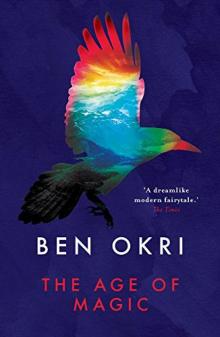 The Age of Magic
The Age of Magic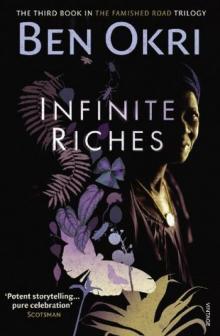 Infinite Riches
Infinite Riches Songs of Enchantment
Songs of Enchantment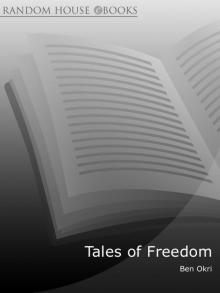 Tales of Freedom
Tales of Freedom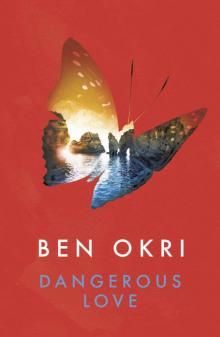 Dangerous Love
Dangerous Love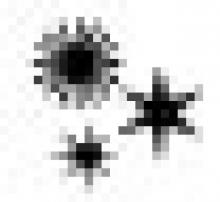 Starbook
Starbook The Famished Road
The Famished Road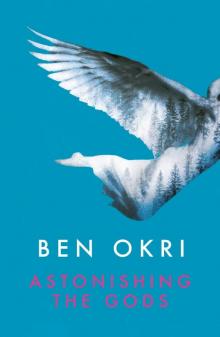 Astonishing the Gods
Astonishing the Gods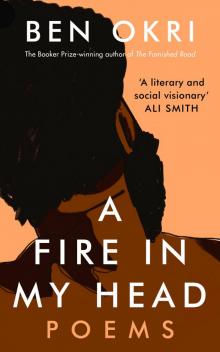 A Fire in My Head
A Fire in My Head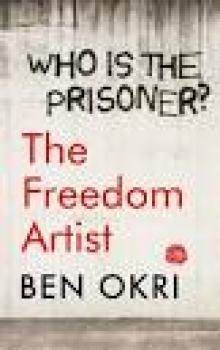 The Freedom Artist
The Freedom Artist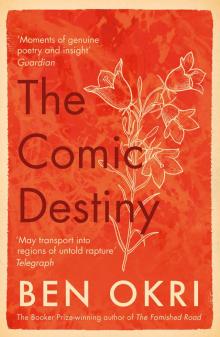 The Comic Destiny
The Comic Destiny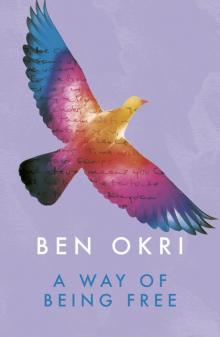 A Way of Being Free
A Way of Being Free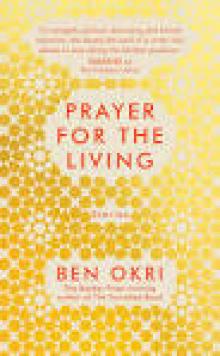 Prayer for the Living
Prayer for the Living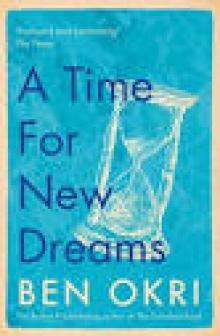 A Time for New Dreams
A Time for New Dreams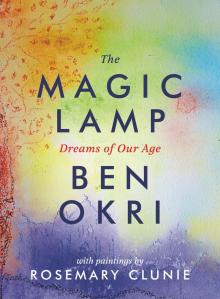 The Magic Lamp
The Magic Lamp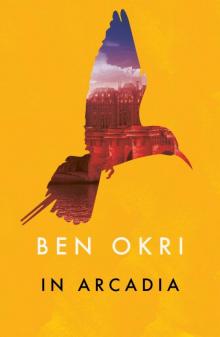 In Arcadia
In Arcadia